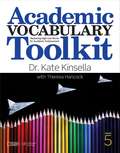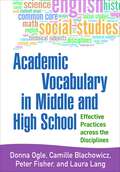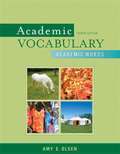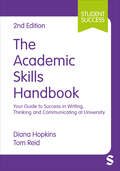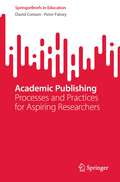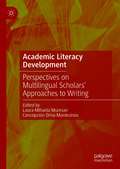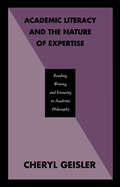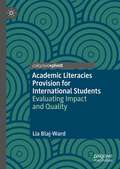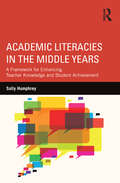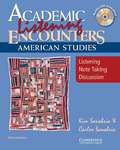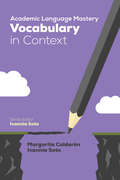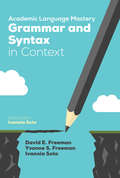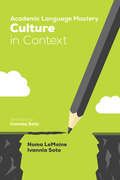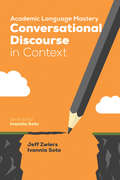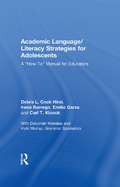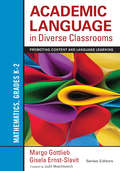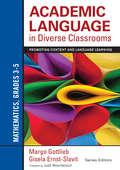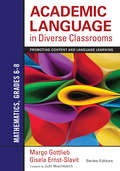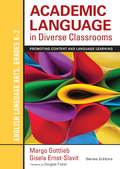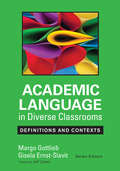- Table View
- List View
Academic Vocabulary Toolkit: Mastering High-Use Words for Academic Achievement (Grade 5)
by Kate Kinsella Theresa HancockDr. Kate Kinsella's NEW Academic Vocabulary Toolkit for Elementary grades is designed to prepare students in grades 3, 4, and 5 for the lexical demands of academic speaking, reading and writing in a Common Core State Standards era. The program ensures students have daily explicit, interactive, and carefully monitored academic language instruction. Students are provided the opportunity to not only learn high-use academic words, but also correctly employ these words in speaking and writing exercises. Using Dr. Kate Kinsella's unique vocabulary teaching process, students will receive the tools needed to master key academic vocabulary, re-engage in school settings, and increase scores on state assessments.
Academic Vocabulary in Middle and High School: Effective Practices across the Disciplines
by Donna Ogle Camille Blachowicz Peter Fisher Laura LangIn order to succeed in school and beyond, students in grades 6-12 need to understand and use both academic language and discipline-specific vocabulary. This book describes effective practices for integrating vocabulary study with instruction in English language arts, history/social studies, and math and science, and for helping students become independent, motivated word learners. The expert authors present a wealth of specific teaching strategies, illustrated with classroom vignettes and student work samples. Connections to the Common Core State Standards (CCSS) are highlighted throughout; an extensive annotated list of print and electronic resources enhances the book's utility.
Academic Vocabulary, Academic Words (4th edition)
by Amy E. OlsenAcademic Vocabulary presents vocabulary building with a visually stimulating, full-color design to pique students' interest and make the process fun. This attractive, highly-interactive workbook improves academic word knowledge through academic readings and interactive exercises. Repetition of the words and getting the students to see the words used in multiple contexts improves memorization.
The Academic Skills Handbook: Your Guide to Success in Writing, Thinking and Communicating at University (Student Success)
by Diana Hopkins Tom ReidThis is your complete guide to success in navigating, writing, thinking, and communicating at university. Packed with tips, diagnostic tools, guided exercises, and full text examples, it equips you to boost your grades, ace your assignments, and get the most out of your time at university. This book helps you: Prepare for and navigate university culture Develop the academic skills needed for success at university Communicate your ideas with confidence and clarity Watch your skills grow with diagnostic tools Create your own study plan tailored to the skills you need Know what your tutor is looking for and how to deliver Turn your skills into success after university The Academic Skills Handbook is specially designed to show you where your strengths are and what you need to work on, so you get a practice plan that is perfect for your needs. It then arms you with the principles and practice to get ahead in your academic writing, presentations and group work. What′s new to this edition? Three chapters on university culture, writing blogs, and online and blended learning (including best practices for using AI as a support tool), as well as new annotated examples of course work and increased coverage of wellbeing. Student Success is a series of essential guides for students of all levels. From how to think critically and write great essays to boosting your employability and managing your wellbeing, the Student Success series helps you study smarter and get the best from your time at university.
The Academic Skills Handbook: Your Guide to Success in Writing, Thinking and Communicating at University (Student Success)
by Diana Hopkins Tom ReidThis is your complete guide to success in navigating, writing, thinking, and communicating at university. Packed with tips, diagnostic tools, guided exercises, and full text examples, it equips you to boost your grades, ace your assignments, and get the most out of your time at university. This book helps you: Prepare for and navigate university culture Develop the academic skills needed for success at university Communicate your ideas with confidence and clarity Watch your skills grow with diagnostic tools Create your own study plan tailored to the skills you need Know what your tutor is looking for and how to deliver Turn your skills into success after university The Academic Skills Handbook is specially designed to show you where your strengths are and what you need to work on, so you get a practice plan that is perfect for your needs. It then arms you with the principles and practice to get ahead in your academic writing, presentations and group work. What′s new to this edition? Three chapters on university culture, writing blogs, and online and blended learning (including best practices for using AI as a support tool), as well as new annotated examples of course work and increased coverage of wellbeing. Student Success is a series of essential guides for students of all levels. From how to think critically and write great essays to boosting your employability and managing your wellbeing, the Student Success series helps you study smarter and get the best from your time at university.
Academic Publishing: Processes and Practices for Aspiring Researchers (SpringerBriefs in Education)
by David Coniam Peter FalveyThis book focuses on the topic of academic publishing. It discusses the mounting, serious problems that researchers, particularly new researchers, encounter when trying to publish their research. The book addresses the issues of publishing as well as the salient factors militating against academic publication and the mitigating factors encouraging academic publication. It provides potential solutions, suggestions, and strategies for overcoming some of these problems. Growing research output from Southeast Asia including Singapore, Malaysia, Taiwan, and China reveals the struggles that many authors have to confront when attempting to publish their work in reputable journals. In both South Africa and other parts of Africa, academic researchers are beginning to show strong evidence of credible academic output. These researchers all need valid outlets for their work and the security that authentic peer review brings to the reviewing process. In the fields of education, social sciences, and professional practices, e.g., architecture and law, recent years have seen the emergence of new outlets for practitioners’ research outputs in areas such as one’s own practice, self-reflection, and narrative inquiry. These outlets are discussed in this book. The book also discusses the malign influence of predatory publications in detail. This book will be beneficial to university academics, postgraduate students, Ph.D. supervisors, and new researchers.
Academic Literacy Development: Perspectives on Multilingual Scholars' Approaches to Writing
by Laura-Mihaela Muresan Concepción Orna-MontesinosThis edited book brings together an international cast of contributors to examine how academic literacy is learned and mastered in different tertiary education settings around the world. Bringing to the fore the value of qualitative enquiry through ethnographic methods, the authors illustrate in-depth descriptions of genre knowledge and academic literacy development in first and second language writing. All of the data presented in the chapters are original, as well as innovative in the field in terms of content and scope, and thought-provoking regarding theoretical, methodological and educational approaches. The contributions are also representative of both novice and advanced academic writing experiences, providing further insights into different stages of academic literacy development throughout the career-span of a researcher. Set against the backdrop of internationalisation trends in Higher Education and the pressure on multilingual academics to publish their research outcomes in English, this volume will be of use to academics and practitioners interested in the fields of Languages for Academic Purposes, Applied Linguistics, Literacy Skills, Genre Analysis and Acquisition and Language Education.
Academic Literacy and the Nature of Expertise: Reading, Writing, and Knowing in Academic Philosophy
by Cheryl GeislerThe first full-length account integrating both the cognitive and sociological aspects of reading and writing in the academy, this unique volume covers educational research on reading and writing, rhetorical research on writing in the disciplines, cognitive research on expertise in ill-defined problems, and sociological and historical research on the professions. The author produced this volume as a result of a research program aimed at understanding the relationship between two concepts -- literacy and expertise -- which traditionally have been treated as quite separate phenomena. A burgeoning literature on reading and writing in the academy has begun to indicate fairly consistent patterns in how students acquire literacy practices. This literature shows, furthermore, that what students do is quite distinct from what experts do. While many have used these results as a starting point for teaching students "how to be expert," the author has chosen instead to ask about the interrelationship between expert and novice practice, seeing them both as two sides of the same project: a cultural-historical "professionalization project" aimed at establishing and preserving the professional privilege. The consequences of this "professionalization project" are examined using the discipline of academic philosophy as the "site" for the author's investigations. Methodologically unique, these investigations combine rhetorical analysis, protocol analysis, and the analysis of classroom discourse. The result is a complex portrait of how the participants in this humanistic discipline use their academic literacy practices to construct and reconstruct a great divide between expert and lay knowledge. This monograph thus extends our current understanding of the rhetoric of the professions and examines its implications for education.
Academic Literacies Provision for International Students: Evaluating Impact and Quality
by Lia Blaj-WardThis book reinterprets the relevance, quality and impact of academic literacies provision at university in light of recent higher education developments in a pandemic-transformed world. Drawing on the author's own experience of researching, implementing and assessing academic literacies provision, and on insights from broader scholarship and professional debates, the book helps set a new direction of travel for academic literacies professionals working in a variety of roles to enable and resource students’ academic and professional growth. It makes recommendations for policy, strategy and scholarship-informed practice that place value on communicating with confidence, clarity and care at university and beyond.
Academic Literacies in the Middle Years: A Framework for Enhancing Teacher Knowledge and Student Achievement
by Sally HumphreyThe professional learning framework this book presents is designed to support teachers’ understandings of how language functions in their academic disciplines. This framework—a 4 x 4 metalinguistic toolkit—is informed by systemic functional linguistic theory and international educational research on academic and disciplinary literacies. The book shows and explains how teachers have applied specific 4 x 4 toolkits with students in middle school classrooms across a range of subjects for curriculum literacy instruction, assessment and feedback, resulting in substantial growth for their students in high-stakes national tests of literacy, as well as writing assessments in a number of subjects. In its focus on disciplinary literacies in diverse sociocultural settings, Academic Literacies in the Middle Years responds to contemporary international curricula for English language and literacy and the need for a strong evidence base for professional learning design.
Academic Listening Encounters: Listening, Note Taking, Discussion (Intermediate)
by Kim Sanabria Carlos SanabriaThis book engages students through interviews and academic lectures on stimulating topics from the field of American Studies. Topics include civil rights, traditional American values in relation to life today, country music, sports, and the globalization of American slang.
Academic Language Mastery: Vocabulary In Context
by Margarita Espino Calderon Ivannia SotoBy now it’s a given: if we’re to help our ELLs and SELs access the rigorous demands of today’s content standards, we must cultivate the “code” that drives school success: academic language. Look no further for assistance than this much-anticipated series from Ivannia Soto, in which she invites field authorities Jeff Zwiers, David and Yvonne Freeman, Margarita Calderon, and Noma LeMoine to share every teacher’s need-to-know strategies on the four essential components of academic language. The subject of this volume is vocabulary. Here, Margarita Calderon reveals how vocabulary is best taught as a tool for completing and constructing more complex messages. With this book as your roadmap, you’ll learn how to: Teach high-frequency academic words and discipline-specific vocabulary across content areas Utilize strategies for teaching academic vocabulary, moving students from Tier 1 to Tiers 2 and 3 words and selecting appropriate words to teach Assess vocabulary growth as you go Our vocabulary instruction must come from the texts our ELLs and SELs are about to read, not from a set of activities that teach words in isolation. This guidebook will help you get started as early as tomorrow. Better yet, read all four volumes in the series and put in place an all-in-one instructional plan for closing the achievement gap.
Academic Language Mastery: Grammar And Syntax In Context
by David E. Freeman Dr Yvonne S. Freeman Ivannia M. SotoBy now it’s a given: if we’re to help our ELLs and SELs access the rigorous demands of today’s content standards, we must cultivate the “code” that drives school success: academic language. Look no further for assistance than this much-anticipated series from Ivannia Soto, in which she invites field authorities Jeff Zwiers, David and Yvonne Freeman, Margarita Calderon, and Noma LeMoine to share every teacher’s need-to-know strategies on the four essential components of academic language. The subject of this volume is grammar and syntax. Here, David and Yvonne Freeman shatter the myth that academic language is all about vocabulary, revealing how grammar and syntax inform our students’ grasp of challenging text. With this book as your roadmap, you’ll learn how to: Teach grammar in the context of students’ speech and writing Use strategies such as sentence frames, passives, combining simple sentences into more complex sentences, and nominalization to create more complex noun phrases Assess academic language development through a four-step process Look inside and discover the tools you need to help students master more sophisticated and complex grammatical and syntactical structures right away. Better yet, read all four volumes in the series and put in place a start-to-finish instructional plan for closing the achievement gap.
Academic Language Mastery: Grammar And Syntax In Context
by David E. Freeman Ivannia M. Soto Dr Yvonne S. FreemanBy now it’s a given: if we’re to help our ELLs and SELs access the rigorous demands of today’s content standards, we must cultivate the “code” that drives school success: academic language. Look no further for assistance than this much-anticipated series from Ivannia Soto, in which she invites field authorities Jeff Zwiers, David and Yvonne Freeman, Margarita Calderon, and Noma LeMoine to share every teacher’s need-to-know strategies on the four essential components of academic language. The subject of this volume is grammar and syntax. Here, David and Yvonne Freeman shatter the myth that academic language is all about vocabulary, revealing how grammar and syntax inform our students’ grasp of challenging text. With this book as your roadmap, you’ll learn how to: Teach grammar in the context of students’ speech and writing Use strategies such as sentence frames, passives, combining simple sentences into more complex sentences, and nominalization to create more complex noun phrases Assess academic language development through a four-step process Look inside and discover the tools you need to help students master more sophisticated and complex grammatical and syntactical structures right away. Better yet, read all four volumes in the series and put in place a start-to-finish instructional plan for closing the achievement gap.
Academic Language Mastery: Culture In Context
by Noma R. LeMoine Ivannia M. SotoBy now it’s a given: if we’re to help our ELLs and SELs access the rigorous demands of today’s content standards, we must cultivate the “code” that drives school success: academic language. Look no further for assistance than this much-anticipated series from Ivannia Soto, in which she invites field authorities Jeff Zwiers, David and Yvonne Freeman, Margarita Calderon, and Noma LeMoine to share every teacher’s need-to-know strategies on the four essential components of academic language. The subject of this volume is culture. Here, Noma LeMoine makes clear once and for all how culturally and linguistically responsive pedagogy validates, facilitates, liberates, and empowers ethnically diverse students. With this volume as your roadmap, you’ll learn how to: Implement instructional strategies designed to meet the linguistic and cultural needs of ELLs and SELs Use language variation as an asset in the classroom Recognize and honor prior knowledge, home languages, and cultures The culture and language every student brings to the classroom have vast implications for how to best structure the learning environment. This guidebook will help you get started as early as tomorrow. Better yet, read all four volumes in the series as an all-in-one instructional plan for closing the achievement gap.
Academic Language Mastery: Vocabulary In Context
by Ivannia M. Soto Margarita Espino CalderonBy now it’s a given: if we’re to help our ELLs and SELs access the rigorous demands of today’s content standards, we must cultivate the “code” that drives school success: academic language. Look no further for assistance than this much-anticipated series from Ivannia Soto, in which she invites field authorities Jeff Zwiers, David and Yvonne Freeman, Margarita Calderon, and Noma LeMoine to share every teacher’s need-to-know strategies on the four essential components of academic language. The subject of this volume is vocabulary. Here, Margarita Calderon reveals how vocabulary is best taught as a tool for completing and constructing more complex messages. With this book as your roadmap, you’ll learn how to: Teach high-frequency academic words and discipline-specific vocabulary across content areas Utilize strategies for teaching academic vocabulary, moving students from Tier 1 to Tiers 2 and 3 words and selecting appropriate words to teach Assess vocabulary growth as you go Our vocabulary instruction must come from the texts our ELLs and SELs are about to read, not from a set of activities that teach words in isolation. This guidebook will help you get started as early as tomorrow. Better yet, read all four volumes in the series and put in place an all-in-one instructional plan for closing the achievement gap.
Academic Language Mastery: Culture In Context
by Ivannia M. Soto Noma R. LeMoineBy now it’s a given: if we’re to help our ELLs and SELs access the rigorous demands of today’s content standards, we must cultivate the “code” that drives school success: academic language. Look no further for assistance than this much-anticipated series from Ivannia Soto, in which she invites field authorities Jeff Zwiers, David and Yvonne Freeman, Margarita Calderon, and Noma LeMoine to share every teacher’s need-to-know strategies on the four essential components of academic language. The subject of this volume is culture. Here, Noma LeMoine makes clear once and for all how culturally and linguistically responsive pedagogy validates, facilitates, liberates, and empowers ethnically diverse students. With this volume as your roadmap, you’ll learn how to: Implement instructional strategies designed to meet the linguistic and cultural needs of ELLs and SELs Use language variation as an asset in the classroom Recognize and honor prior knowledge, home languages, and cultures The culture and language every student brings to the classroom have vast implications for how to best structure the learning environment. This guidebook will help you get started as early as tomorrow. Better yet, read all four volumes in the series as an all-in-one instructional plan for closing the achievement gap.
Academic Language Mastery: Conversational Discourse in Context
by Jeff Zwiers Ivannia M. SotoBy now it’s a given: if we’re to help our ELLs and SELs access the rigorous demands of today’s content standards, we must cultivate the “code” that drives school success: academic language. Look no further for assistance than this much-anticipated series from Ivannia Soto, in which she invites field authorities Jeff Zwiers, David and Yvonne Freeman, Margarita Calderon, and Noma LeMoine to share every teacher’s need-to-know strategies on the four essential components of academic language. The subject of this volume is conversational discourse. Here, Jeff Zwiers reveals the power of academic conversation in helping students develop language, clarify concepts, comprehend complex texts, and fortify thinking and relational skills. With this book as your roadmap, you’ll learn how to: Foster the skills and language students must develop for productive interactions Implement strategies for scaffolding paired conversations Assess student’s oral language development as you go It’s imperative that our ELLs and SELs practice academic language in rich conversations with others in school, especially when our classrooms may be their only opportunities to receive modeling, scaffolding, and feedback focused on effective discourse. This book, in concert with the other three volumes in the series, can provide both a foundation and a framework for accelerating the learning of diverse students across grade levels and disciplines.
Academic Language Mastery: Conversational Discourse in Context
by Jeff Zwiers Ivannia M. SotoBy now it’s a given: if we’re to help our ELLs and SELs access the rigorous demands of today’s content standards, we must cultivate the “code” that drives school success: academic language. Look no further for assistance than this much-anticipated series from Ivannia Soto, in which she invites field authorities Jeff Zwiers, David and Yvonne Freeman, Margarita Calderon, and Noma LeMoine to share every teacher’s need-to-know strategies on the four essential components of academic language. The subject of this volume is conversational discourse. Here, Jeff Zwiers reveals the power of academic conversation in helping students develop language, clarify concepts, comprehend complex texts, and fortify thinking and relational skills. With this book as your roadmap, you’ll learn how to: Foster the skills and language students must develop for productive interactions Implement strategies for scaffolding paired conversations Assess student’s oral language development as you go It’s imperative that our ELLs and SELs practice academic language in rich conversations with others in school, especially when our classrooms may be their only opportunities to receive modeling, scaffolding, and feedback focused on effective discourse. This book, in concert with the other three volumes in the series, can provide both a foundation and a framework for accelerating the learning of diverse students across grade levels and disciplines.
Academic Language/Literacy Strategies for Adolescents: A "How-To" Manual for Educators
by Debra L. Hirai Irene Borrego Emilio Garza Carl T. KloockFast-paced, practical, and innovative, this text for pre-service and in-service teachers features clear, easily accessible lessons and professional development activities to improve the delivery of academic language/literacy education across the content areas in junior/middle school and high school classrooms. Numerous hands-on tools and techniques demonstrate the effectiveness of content-area instruction for students in a wide variety of school settings, particularly English language learners, struggling readers, and other special populations of students. Based on a strong professional development model the authors have been instrumental in designing, Academic Language/Literacy Strategies for Adolescents addresses: motivation attributes of academic language vocabulary: theory and practice reading skills development grammar and writing. A wealth of charts, graphs, and lesson plans give clear examples of academic language/literacy strategies in action. The appendices – a key component of the practical applications developed in the text – include a glossary, exemplary lessons that address key content areas, and a Grammar Handbook. In this era of increased accountability, coupled with rapid demographic change and challenges to traditional curricula and pedagogical methods, educators will find this book to be a great resource.
Academic Language in Diverse Classrooms: Promoting Content and Language Learning
by Dr Margo Gottlieb Gisela Ernst-SlavitMake every student fluent in the language of learning. The Common Core and ELD standards provide pathways to academic success through academic language. Using an integrated Curricular Framework, districts, schools and professional learning communities can: Design and implement thematic units for learning Draw from content and language standards to set targets for all students Examine standards-centered materials for academic language Collaborate in planning instruction and assessment within and across lessons Consider linguistic and cultural resources of the students Create differentiated content and language objectives Delve deeply into instructional strategies involving academic language Reflect on teaching and learning
Academic Language in Diverse Classrooms: Promoting Content and Language Learning
by Dr Margo Gottlieb Gisela Ernst-SlavitMake every student fluent in the language of learning. The Common Core and ELD standards provide pathways to academic success through academic language. Using an integrated Curricular Framework, districts, schools and professional learning communities can: Design and implement thematic units for learning Draw from content and language standards to set targets for all students Examine standards-centered materials for academic language Collaborate in planning instruction and assessment within and across lessons Consider linguistic and cultural resources of the students Create differentiated content and language objectives Delve deeply into instructional strategies involving academic language Reflect on teaching and learning
Academic Language in Diverse Classrooms: Promoting Content and Language Learning
by Dr Margo Gottlieb Gisela Ernst-SlavitMake every student fluent in the language of learning. The Common Core and ELD standards provide pathways to academic success through academic language. Using an integrated Curricular Framework, districts, schools and professional learning communities can: Design and implement thematic units for learning Draw from content and language standards to set targets for all students Examine standards-centered materials for academic language Collaborate in planning instruction and assessment within and across lessons Consider linguistic and cultural resources of the students Create differentiated content and language objectives Delve deeply into instructional strategies involving academic language Reflect on teaching and learning
Academic Language in Diverse Classrooms: Promoting Content and Language Learning
by Dr Margo Gottlieb Gisela Ernst-SlavitMake every student fluent in the language of learning. The Common Core and ELD standards provide pathways to academic success through academic language. Using an integrated Curricular Framework, districts, schools and professional learning communities can: Design and implement thematic units for learning Draw from content and language standards to set targets for all students Examine standards-centered materials for academic language Collaborate in planning instruction and assessment within and across lessons Consider linguistic and cultural resources of the students Create differentiated content and language objectives Delve deeply into instructional strategies involving academic language Reflect on teaching and learning
Academic Language in Diverse Classrooms: Definitions and Contexts
by Dr Margo Gottlieb Gisela Ernst-SlavitEnsure your school speaks the language of success! Since the introduction of the Common Core, schools realize the necessity for a deep understanding of academic language as a stepping stone to academic achievement. The expectations for more robust curriculum, instruction, and assessment require administrators, teachers, and students to retool for academic success. This companion volume to Margo Gottlieb and Gisela Ernst-Slavit’s six-book series on academic language provides a thorough overview of key concepts and effective practices. Optimized for curricular planning and in-classroom reference, with particular attention to linguistically and culturally diverse students, the book includes: Definitions and examples of the dimensions of academic language. A step-by-step template for teachers to incorporate academic language into their planning for student learning. Graphic models that illustrate academic language use across the content areas.
